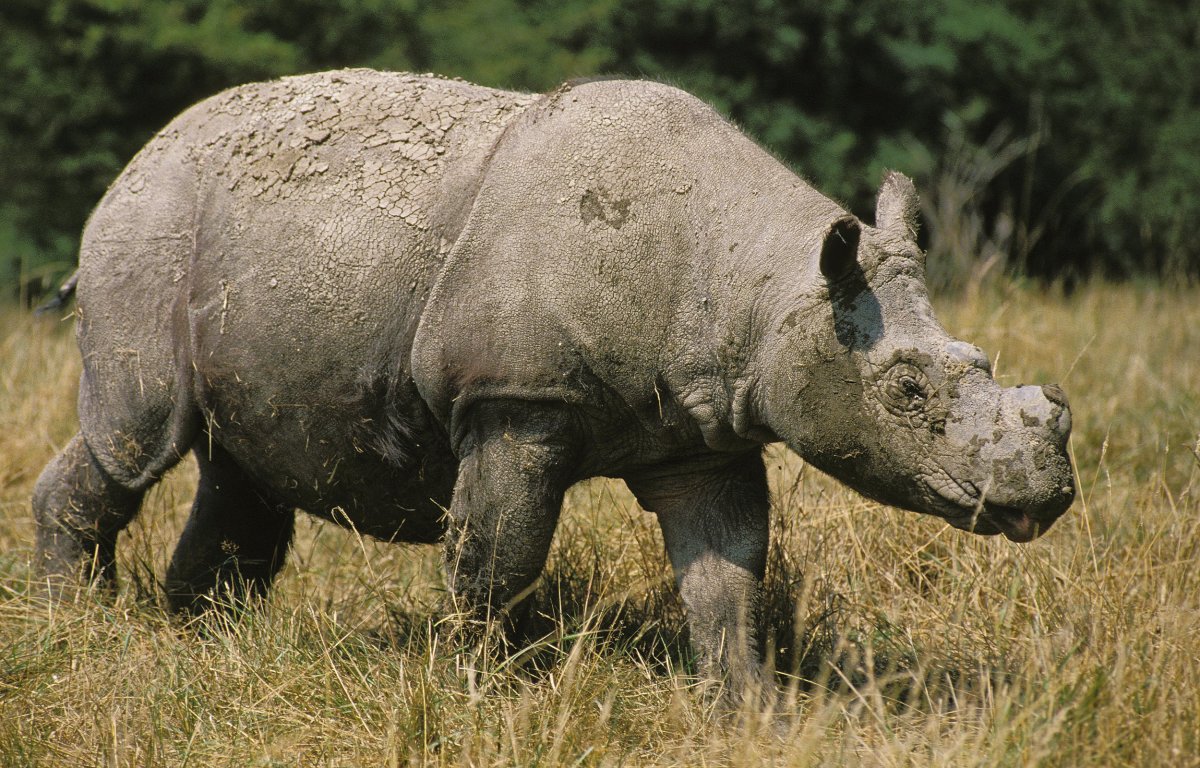A baby rhino has been born in a wildlife sanctuary in Indonesia, sparking hope for the future of the critically endangered species.
The little Sumatran rhino was born on Saturday at the Sumatran Rhino Reserve at Way Kambas National Park (SRS TNWK) in Sumatra, an island in western Indonesia, to parents Delilah and Harapan.
The baby male weighed around 55 pounds, and is the fifth calf to be born under the semi-wild breeding program at the park.

Sumatran rhinos are one of the most threatened species of rhino in the world, with an estimated total remaining population of less than 80, according to the World Wide Fund for Nature (WWF) and the International Union for Conservation of Nature (IUCN).
They are listed as "critically endangered" on the IUCN Red List of Threatened Species, and are the smallest species of rhino, measuring only 3.3 to 5 feet high.
"[There are] estimated to be between 34 and 47 individuals, making it the most endangered of the world's five rhino species," Jason Gilchrist, a behavioral ecology lecturer at Edinburgh Napier University in the U.K., told Newsweek.
These rhinos have been targeted by poachers, as their horns are often illegally traded for traditional Chinese medicine. This hunting, combined with climate change and habitat loss due to logging and human development, has led their populations to drop by 70 percent over the last 30 years. Their cousin species, the Javan rhino, is also critically endangered, with a similarly tiny population remaining.
"A history of hunting (poaching) and deforestation has left us with a geographically constricted population of scarce and isolated individual animals," Gilchrist said. "So, today, the main issue that needs addressing is getting animals together for them to breed. It's simple; but if individuals don't meet, they won't breed, and if they don't breed, the population and species will ultimately go extinct."
This calf marks the second baby Sumatran rhino born at the park this year, taking the total number of these rhinos at the sanctuary to 10. Before the first of these five births, there hadn't been a Sumatran rhino born in an Indonesian sanctuary for more than 120 years.
"We are grateful for the fifth birth at SRS TNWK. This birth is also the birth of the second Sumatran rhino in 2023. This further confirms the commitment of the Government of the Republic of Indonesia in carrying out rhino conservation efforts in Indonesia, especially the Sumatran rhino," Indonesian minister of environment and forestry (LHK) Siti Nurbaya Bakar said in a statement.
This was the first successful birth from the calf's mother, Delilah, who is seven years old and was also born at the sanctuary.
"Based on the report we received, the rhino Delilah gave birth to a male calf outside the estimated time, namely around 04.00 WIB, Saturday (25/11), on the 460th day of pregnancy, 10 days earlier than the estimated birth. At 08.19 WIB, the rhino Delilah was found with her calf in the forest by SRS TNWK animal guards," Satyawan Pudyatmoko, the director general of Natural Resources and Ecosystem Conservation (KSDAE) KLHK, said in the statement.

The calf—who is yet to be named—is doing well, and can stand upright, walk and feed from his mother.
"The main goal is to produce Sumatran rhino calves to maintain the survival of the Sumatran rhino species which is now threatened with extinction," said Satyawan. "In the future, Sumatran rhino calves resulting from the breeding program at SRS TNWK can be released back into their natural habitat."
There are several other hurdles that need to be overcome if we hope to restore the Sumatran rhino population, as their small remaining population means that they have very little genetic diversity left, meaning that they have a much lowered potential for adaptive genetic variation.
"By simple nature of low numbers, greater extinction risk due to natural stochastic events, e.g. extreme climate events and disease can be more impactful on smaller populations," Gilchrist said. "With any small/declining wild animal population, conservations need to identify what has/is causing decline. For the long-term sustainability of the population in the wild, we need to remove the extinction drivers.
"In an ideal world, captive-bred individuals could be released into the wild and to populations that need a genetic boost as well as a numerical boost—and release programs should factor genetics into decisions on where and when to release captive-bred rhino," he said.
"However, in the current predicament (with possibly as few as 30 Sumatran rhinos alive in the world today), we just need to try to keep the remaining individuals alive and breeding to get the numbers up. It may also be possible to increase the gene pool of the captive population by using frozen eggs and sperm of deceased Sumatran rhino—effectively bringing back the genes of dead rhinos. But this is a technically challenging operation and cannot be relied upon."
Update 11/30/23, 11:49 a.m. ET: This article was updated with comment from Jason Gilchrist.
Do you have a tip on a science story that Newsweek should be covering? Do you have a question about Sumatran rhinos? Let us know via science@newsweek.com.
Uncommon Knowledge
Newsweek is committed to challenging conventional wisdom and finding connections in the search for common ground.
Newsweek is committed to challenging conventional wisdom and finding connections in the search for common ground.
About the writer
Jess Thomson is a Newsweek Science Reporter based in London UK. Her focus is reporting on science, technology and healthcare. ... Read more





